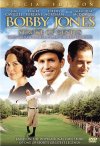BUY THE DVD:
|


|
|
|
SYNOPSIS:
| |
about golf legend bobby jones, the icon who retired from competition at the tender age of 28.
|
|
|
MOVIE FACT:
| |
factual errors: while sitting in a classroom, jones is taking notes with his left hand. jones was right handed.
|
|
|
RATING:
|


two out of four possible stars
|
|
|
|
When cruising your local movie showtimes, viewers should be warned of the fact that although Bobby Jones: Stroke of Genius was directed by a man whose first name is Rowdy, that name has next to nothing to do with the attitude in this film. Like the view through a foggy window or a dirty pane of glass, the characterizations in Bobby Jones aren't a vivid recreation of the times. While the costuming and set decoration cannot be faulted (very well done cinematography by Tom Stern in only his third feature film sitting in the director of photography's chair), the life of Bobby Jones seems muted and sedate in the screenplay director (Rowdy) Herrington wrote with Bill Pryor and Tony De Paul.
Just because the sport of golfing is usually regarded as an almost solemn exercise of athleticism doesn't mean the players themselves were always so buttoned-down in their regular lives. Even the stately and refined upper-crust citizens of Atlanta must have had a good go of it sometimes. At their darkest and deepest moments, none of the characters really ever takes a good whack at something. Though there are moments where lead star Caviezel throws his golf club and swears on the course, it's far from a truly inflammatory performance. Perhaps the director assumed the likely viewers of this film would possess the same temperament of a modern golf tournament audience?
The casting of James Caviezel in the lead role of Bobby Jones should probably be questioned, since the actor is thirty-five years old and must play a character who ages from his late teens to his late twenties. Caviezel can handle the twenties with ease, but believing him to be of college age is rather difficult with the world-weary lines that surround his eyes. Although the real Bobby Jones might have actually looked older than his age because of an affliction with syringomyelia (a debilitating disorder where a cyst forms in the spinal cord, causing a variety of weaknesses within the body), it takes a leap of faith to believe Caviezel can portray such a youthful age.
It's not for lack of trying though, because Caviezel certainly puts his heart and soul into the role, his surprising head of blond hair taking only a few scenes to fade into the background. But Caviezel has precious few scenes to really launch an emotional performance as the film is made too weighty by its ponderous and usually wearisome feel. It's as if the director really wanted to audience watching this film to feel as tired as the disease-wracked Bobby Jones must have felt during his life.
In other casting, Jeremy Northam is expertly chosen to play Jones's on-course golfing foe, "Walter Hagen." Viewers will be thankful for Northam's scenes as he adds some spice and flavor to the tepid theatrical experience. Northam seems to be an expert in bringing more to the screen than his character might otherwise allow. He looks to have refined the art of performing with his entire body, rather than through simply his voice and as golfing great Hagen, he fills the shoes of a needed, almost capricious role.
A supporting performance by Claire Forlani as "Mary," Bobby's fiancée and later, wife, seems to be well-polished and in his role as "O.B. Keeler," Jones's friend who would later become his biographer, Malcolm McDowell gives a steady and even enduring performance, especially when his character is making speeches for a sports radio show. Dan Albright is well cast in the role as Jones's grandfather as is Brett Rice as Jones's father. Rounding out the main players, Connie Ray fills the shoes as Jones's mother with ease and very much looks the part of a turn-of-the-century Southern woman.
The score is lively, if somewhat predictably composed, by the prolific James Horner, though sometimes the cues give the movie more "oomph" than it shows in its screenplay. It sometimes sounds as if Horner composed the score after having seen the cinematographic vistas without realizing the tone of the characters in the film. Or perhaps the director put in order for a sweeping score to glaze over the fact that his film wasn't the most dashing creation. Though as usual, Horner's score is probably worth owning on compact disc on its own.
So despite the beautiful and peaceful nature of the film, the low-key approach to the subject matter is compounded by the two hour running time, which only seems long because of the rather quiet screenplay. Two hours is a perfectly respectable length for a dramatic feature film, but Bobby Jones just can't seem to handle it. And one must call into question the pride the filmmakers show at the end of the film were Jones shows viewers the rolling hills and trees of the site of which will soon become his future creation: the course of the "Masters" golfing tournament, a competition whose members have, historically, tried to keep black players and women from taking the field.
Review by Kelsey Wyatt.
| |
|